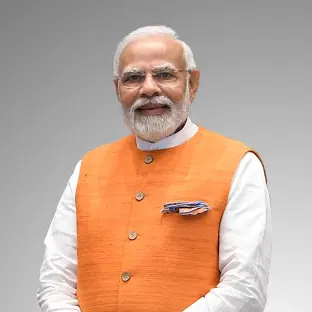Prime Minister Narendra Modi’s completion of 23 years in office is an occasion to reflect on the profound impact his leadership has had on India’s political, economic, and social landscape. Beginning his journey as the Chief Minister of Gujarat in 2001 and transitioning to his role as India’s Prime Minister in 2014, Modi has demonstrated a relentless focus on governance, development, and national pride. This milestone marks not just a personal achievement but a significant chapter in India’s contemporary history.
Economic Reforms and Global Standing
One of the defining features of Modi’s leadership has been his emphasis on economic reforms aimed at transforming India into a global economic powerhouse. From the Make in India campaign to boosting the country’s manufacturing sector, his government has consistently pushed for policies that position India as a preferred investment destination.
The implementation of the Goods and Services Tax (GST) and the Insolvency and Bankruptcy Code (IBC) has been hailed as two of the most significant economic reforms in independent India. These measures streamlined India’s indirect tax structure and improved the ease of doing business, attracting foreign investment and improving India’s standing on the global stage.
Moreover, the Atmanirbhar Bharat initiative, launched during the COVID-19 pandemic, reflects Modi’s vision of creating a self-reliant India, reducing dependence on foreign imports, and promoting domestic industries. This policy resonates with the long-term goal of making India a manufacturing hub for the world.
Social Welfare: Inclusion and Empowerment
Under Modi’s leadership, social welfare programs have played a pivotal role in addressing the needs of India’s marginalized and vulnerable populations. The Jan Dhan Yojana, a financial inclusion program that has opened millions of bank accounts for the unbanked, revolutionized access to financial services for the poor.
The Pradhan Mantri Awas Yojana aims to provide affordable housing for all, while schemes like Ujjwala Yojana and Swachh Bharat Abhiyan have made tangible improvements in the lives of millions by providing clean cooking fuel and promoting sanitation. These initiatives highlight Modi’s focus on improving the quality of life for India’s lower-income and rural populations.
Focus on Infrastructure and Technological Advancement
PM Modi’s government has also prioritized infrastructure development, with mega projects such as the Bharatmala and Sagarmala programs, aimed at improving road connectivity and port-led development, respectively. The introduction of high-speed rail projects and extensive work in the energy sector, including renewable energy investments, have further demonstrated his commitment to modernizing India’s infrastructure.
Digitization has been another cornerstone of his tenure, with the Digital India campaign pushing for increased access to digital services and fostering a digital economy. Initiatives like Aadhaar, the world’s largest biometric identification system, and the Unified Payments Interface (UPI) have transformed the way Indians access government services and perform financial transactions, driving financial inclusion and digital literacy.
National Security and Foreign Policy
Under Modi’s tenure, national security has remained a priority, with a strong focus on modernizing the military and defense capabilities. His government has taken a firm stance on terrorism and border security, especially with its response to external threats. Initiatives such as the Balakot airstrikes in 2019 reflect his administration’s proactive approach to ensuring India’s security.
On the international stage, Modi’s foreign policy has been characterized by his focus on strengthening India’s relations with both neighboring and global powers. Whether it is through his “Neighborhood First” policy or strategic partnerships with countries like the United States, Japan, and Israel, Modi has elevated India’s diplomatic profile and positioned the nation as a key player on the global stage.
Conclusion: A Legacy of Leadership
As Modi completes 23 years in office, his tenure reflects a blend of ambitious reforms, inclusive governance, and strong leadership that has transformed India into a more confident and assertive nation. His focus on economic growth, social welfare, infrastructure, and national security has redefined India’s trajectory in the 21st century.
While challenges remain, Modi’s leadership has left an indelible mark on the country’s development path, and the next chapter of his journey will undoubtedly continue to shape India’s future. With global recognition and widespread domestic support, Narendra Modi’s tenure remains a testament to his vision for a New India—one that is self-reliant, prosperous, and resilient.







